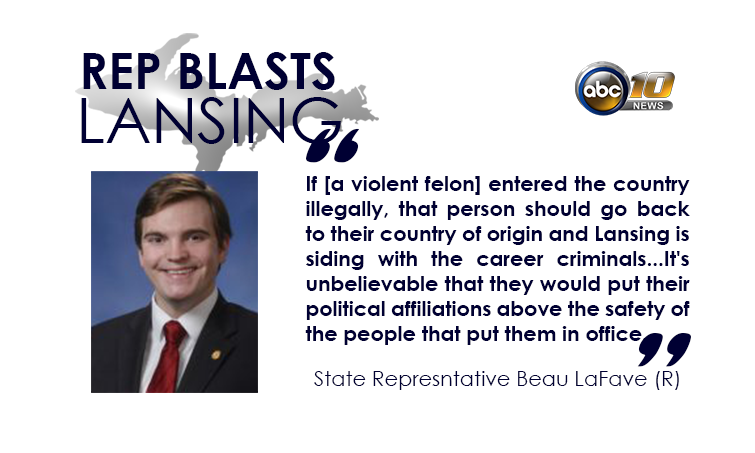Sanctuary City debate rages on at local, state & national levels

SAN FRANCISCO, CA — The debate over sanctuary cities is heating up across the nation.
On Tuesday, a federal judge in San Francisco ruled against President Trump, saying the commander in chief cannot punish sanctuary cities by withholding federal funds. The judge’s decision stops Trump’s executive order that would punish cities that refuse to cooperate with federal officials.
The Trump Administration says sanctuary cities put dangerous criminals back on the street. In Michigan, the City of Lansing recently overturned a previous decision to become a sanctuary city.
State Representative Beau LaFave introduced legislation that would prohibit the creation of those cities in Michigan going forward.
“What I don’t think is reasonable is for a city to say that although this illegal immigrant was convicted on felony charges of murder or any other violent thing in their home country, but now they’re here illegally and we can’t get rid of him, it wouldn’t be right. That’s silly,” said LaFave.
LaFave, who introduced this bill last month, says he’s having ongoing discussions with his colleagues about this issue. Abdul El-Sayed, who is running for governor, wants to make Michigan a Sanctuary State.

LANSING — An Upper Peninsula lawmaker who introduced legislation last month that would outlaw local governments from enacting ordinances from communicating with federal officials regarding a person’s immigration status, is concerned with the City of Lansing’s decision to become a Sanctuary City.
City officials are not to ask for, or record, information about immigration status except as required by state or federal law.
Lansing Police will not arrest anyone based on violations of immigration law and won’t ask victims, or witnesses, of a crime about their immigration status. And that’s not sitting well with Representative Beau LeFave, who introduced the Sanctuary City Prohibition Act.
“I know that the majority of the people in the Upper Peninsula agree with me that if you’ve got a violent felon that has entered the country illegally, that person should go back to their country of origin and Lansing is siding with the career criminals,” said LeFave. “It’s unbelievable that they would put their political affiliations above the safety of the people that put them in office.”
The White House has threatened to withhold funding from Sanctuary Cities, but the council determined that their status wouldn’t actually threaten their funding.
Opponents of Representative LaFave’s legislation say his bill would put unnecessary burden on local law enforcement to carry out the duties of I.C.E. Lansing city council voted unanimously to declare themselves a ‘Welcoming City.’
LANSING — State Rep. Beau LaFave of Iron Mountain, has introduced a bill that creates the Sanctuary Policy Prohibition Act that will outlaw local units of government from enacting ordinances that limit a local official, employee or police officer from communicating with federal officials regarding the immigration status of an individual.
This bill is not a departure from common practice, said Rep. LaFave. Local officials who ignore the law and turn their communities into sanctuaries for illegal immigrants are endangering people and violating the public trust.
Police officers should not be prohibited from checking for illegal immigration status in their current law enforcement routines.
Rep. LaFave believes Michigan’s local communities should never be safe havens for those who break the law and commit crimes, including the act of entering our country illegally, and that police officers should not be prohibited from checking for illegal immigration status in their current law enforcement routines.
‘An overwhelming number of Americans believe that law enforcement officers who arrest illegal immigrants for crimes should be able to turn them over to federal authorities, LaFave said. This is a public safety issue and this legislation will help officers remove potentially dangerous and threatening criminals off our streets.
House Bill 4334 has been referred the House Committee on Local Government.
